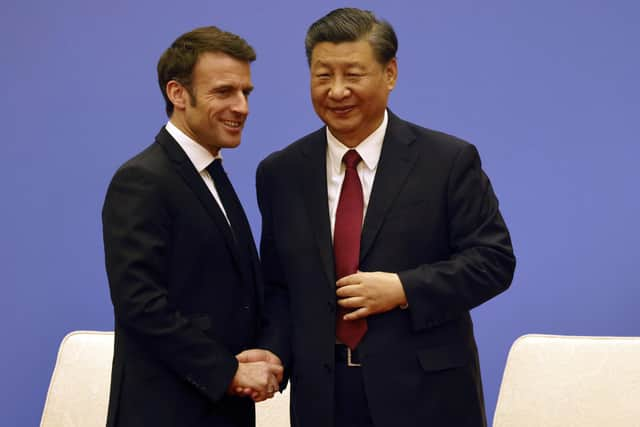War against Ukraine: Emmanuel Macron appeals to China leader Xi Jinping to 'bring Russia to senses'
Mr Macron pointed to Chinese support for the UN Charter, which calls for respect of a country's territorial integrity, and for nuclear agreements.
He said peace and stability based on those were threatened by the Russian president's invasion of Ukraine.
Advertisement
Hide AdAdvertisement
Hide AdMr Xi's government said it had a "no limits friendship" with Russia ahead of the February 2022 attack but has tried to appear neutral.


Mr Xi gave no sign China, which declared it had a "no limits friendship" with Moscow before last year's attack, had changed its stance since calling for peace talks in February.
But he added his personal authority by repeating the appeal at a joint event with Mr Macron in front of reporters.
"Peace talks should resume as soon as possible," Mr Xi said.
Governments should "avoid taking actions that will further make the crisis deteriorate or even get out of control", Mr Xi said.
He called for co-operation to reduce disruption of food and energy supplies, especially for developing countries.
"I know I can count on you, under the two principles I just mentioned, to bring Russia to its senses and bring everyone back to the negotiating table," Mr Macron told Mr Xi in Beijing.
"We need to find a lasting peace," Mr Macron said. "I believe that this is also an important issue for China, as much as it is for France and for Europe."
Advertisement
Hide AdAdvertisement
Hide AdMr Xi said Beijing and Paris are "staunch promoters of multipolarisation of the world", a reference to reducing US dominance in economic and political affairs.
Mr Xi's government sees Russia as a source of energy and as a partner in opposing what they say is US aggression and unfair criticism of their human rights records.
China is the biggest buyer of Russian oil and gas, which helps prop up the Kremlin's revenue in the face of western sanctions.
That increases Chinese influence, but Mr Xi appears reluctant to jeopardise that partnership by pressuring Putin.
"China has always adhered to an objective and fair position on the issue of the Ukraine crisis," said a foreign ministry spokesman, Mao Ning.
"We have been an advocate of a political solution to the crisis and a promoter of peace talks."
Earlier, Mr Macron said during a meeting with the ruling communist party's number two leader, Li Qiang, that France wants to "build a common path" in dealing with "all the major conflicts" in addition to Ukraine.
Mr Li said there was likely to be a "broad consensus" between Mr Macron and Mr Xi but gave no indication whether Beijing might be willing to lobby Moscow to make peace.
Advertisement
Hide AdAdvertisement
Hide AdThe meeting will "send positive signals of concerted efforts by China, France and Europe to maintain world peace and stability," Mr Li said.
Mr Macron was accompanied to Beijing by European Commission president Ursula von der Leyen in a show of European unity.
Last week Ms von der Leyen said the European Union must be prepared to develop measures to protect trade and investment that China might exploit for security and military purposes.
Meanwhile, Nato's 31 member countries warned on Wednesday of "severe consequences" should China start sending weapons and ammunition to Russia.
Nato secretary-general Jens Stoltenberg said giving lethal aid would be a "historic mistake".
He warned there would be "severe consequences" but declined to give details.
Comments
Want to join the conversation? Please or to comment on this article.